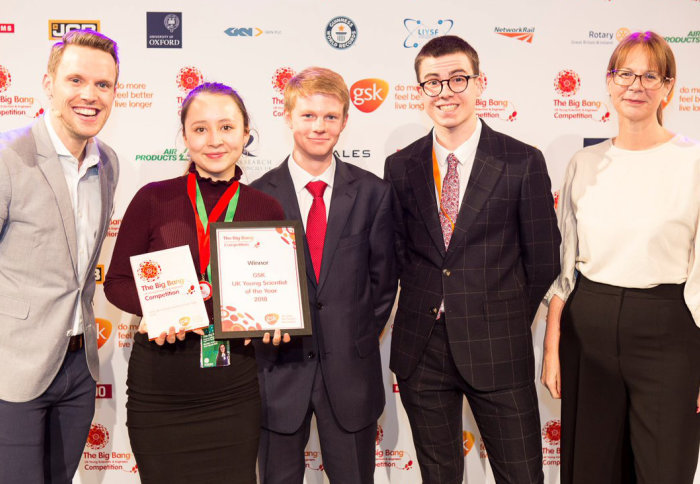Imperial intern named GSK Young Scientist of the Year 2018

A student who worked last summer in the Department of Chemical Engineering has been named GSK Young Scientist of the Year for 2018.
Emily Xu, who attends James Allen’s Girls’ School in London, spent five weeks working with Ben Slater, a PhD student in Dr. Bradley Ladewig's research group, following an application for a Nuffield Research Placement.
It was Emily’s work during this placement where she was supervised by Ben and Dr Ladewig, that led to her being awarded the top prize at the Big Bang Fair in Birmingham, as well as £2,000 prize money, a range of engagement opportunities with GSK and a role as ambassador for the competition.
Reflecting on the award, Emily said: “All the finalists’ projects were of such a high level that I was sure anyone could have won the title, so you can imagine how surprised I was to have been given the award.”
Emily initially applied online and was invited to the final event at the Birmingham NEC. All finalists were asked to showcase their projects to 20,000 local visitors, pass a judging review and then pitch their projects to a panel of industry experts.
At the end of the second day Emily won her award and has since featured live on BBC Breakfast and Five Live, as well as various other media outlets.
Emily’s project - Chiral Separation of racemic mixtures using liquid phase separation techniques with homochiral metal organic frameworks - focused on separating enantiomers (mirror image molecules) using a relatively new material called a ‘metal organic framework’ (MOF).
Emily researched how the separation conditions and the structure of the MOF effected how efficiently it was able to adsorb and separate a particular enantiomer from its counterpart.
Research into these MOFs could potentially improve the way pharmaceutical companies separate enantiomers, allowing the production of safer, more efficient and accessible drugs in a cost-effective and efficient way.
Speaking about her time at Imperial, Emily said: “The opportunity to conduct my own experiments alongside passionate PhD students gave me a positive perspective on a career in research. Additionally, the opportunity to discuss ongoing projects and see first-hand the collaborations and problem solving was extremely gratifying.”
She added: “One key thing I have learnt this year is to follow your interests and take every opportunity that comes your way, because whatever happens you will always have something to gain, and nothing to lose.”
After her positive experience Emily decided to study chemical engineering at university, and having been offered a place at Imperial, she hopes to start her course this coming year.
Article text (excluding photos or graphics) © Imperial College London.
Photos and graphics subject to third party copyright used with permission or © Imperial College London.
Reporter
Press Office
Communications and Public Affairs
- Email: press.office@imperial.ac.uk
